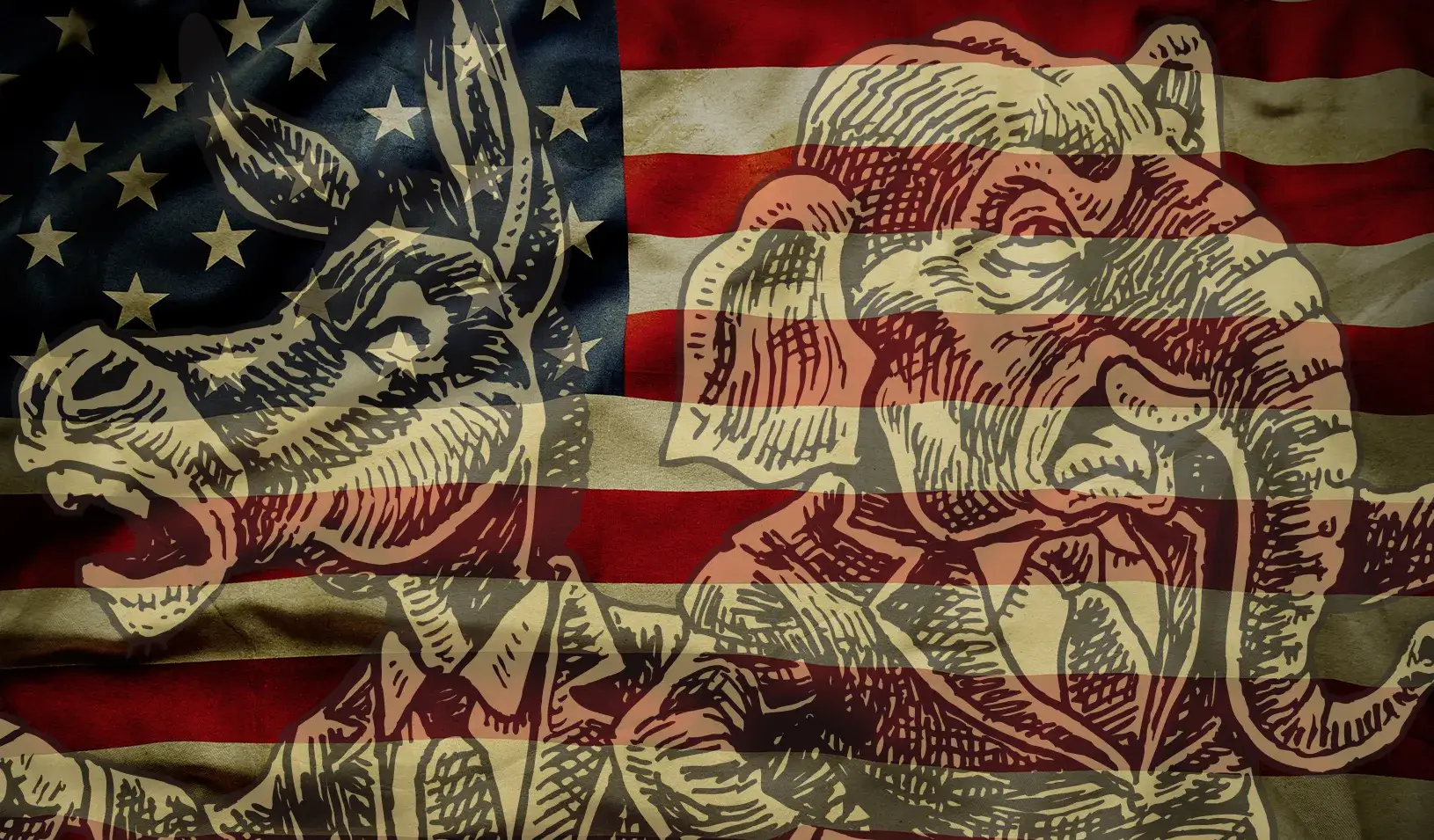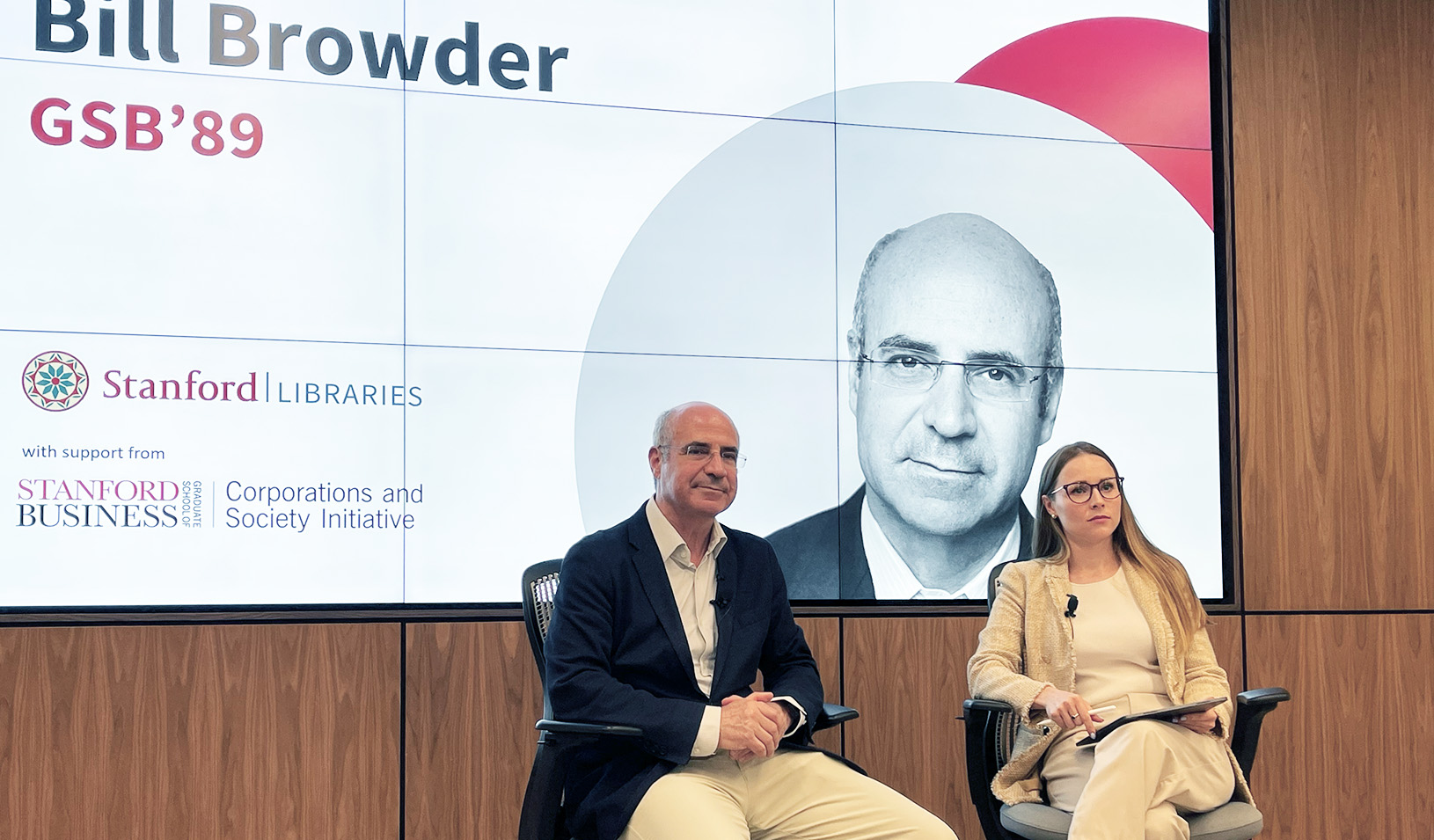
Photo Illustration by Tricia Seibold (sources: iStock/STILLFX and iStock/KeithBishop)
Once an election season starts, politicians appear to act according to their own separate rulebook. But one of the most convenient things to forget when observing their behavior is that politics is a tough game.
“We often make the mistake of thinking that politicians don’t have a clue what they’re doing,” says Stanford Graduate School of Business professor of political economy Steve Callander. “These things are hard. How do you structure a trade deal? How do you negotiate with China? What do you know about immigration? These are extremely hard problems with few ready solutions in a sea of self-interested partisanship.”
But politicians don’t just have to untangle such issue intricacies. They also have to appeal to what might be simultaneously the most fickle and discerning crowd out there: voters.
Rock, meet hard place.
Here, four political scientists peel back campaign chicanery and party posturing to show how politicians walk the tightrope of public opinion by crafting their messages, performing acrobatic acts of pandering, and actually changing constituents’ opinions to win elections.
The Pull to Pander
In a theory of executive decision-making, Ken Shotts, a professor of political economy at Stanford GSB, explores a signature dilemma of representative democracy: What happens when a politician must choose between an unpopular policy that she believes is in the public’s interest and a popular one that she believes is not?
The game-theoretic model, which Shotts developed in collaboration with Princeton’s Brandice Canes-Wrone and Dartmouth’s Michael C. Herron, lays out such scenarios for incumbents seeking reelection. On one hand, politicians can display what Shotts calls “true leadership:” Go with the better policy, even though it flies in the face of public opinion. The flipside would be to pander: Support the popular policy, even though politicians know it isn’t in the public’s best interest.
Which do they choose? Often, it depends on how long they’ve been in office. Newly elected leaders who display leadership early on have time for the public to come around to the idea that the policy was good. “They actually have an electoral incentive not to pander, even though pandering would give them a short-term jump in popularity,” Shotts says. “But, as the election gets close, then the politician has more incentive to pander, because it’s less likely the voters are going to observe the effects before the next election.”
This tension could help explain, for example, some curious about-faces on issues like free trade during election seasons. “Voters typically think that free trade is a bad thing. Economists think it’s a good thing. Politicians probably know more about what economists think about free trade than a typical citizen does, but come election time, politicians become less pro-free trade. And they’ll do a variety of other things that voters think is in their interest, but that the politician doesn’t think is in their interest.”
In addition to the timing of the election, the closeness of the race can also play a part in determining the heft of this incentive to pander. A politician who’s far ahead has the luxury of ignoring the urge to pander. Similarly, one who’s far behind could also be disinclined to pander, opting instead for an unpopular policy that serves voters’ interests, in the hope of being electorally rewarded if the public changes its views. But in close contests, where any advantage could be pivotal in securing the election, the pull to pander is especially intense.
“Any time there’s a tight race,” Shotts says, “I get really worried for policymaking. My concern is that people are going to take lots of positions that sound good but aren’t.”
Optimism Can Help — And Hurt
Conventional wisdom says that Americans like optimistic leaders. In fact, Stanford GSB professor of political economy Neil Malhotra and Tel Aviv University’s Yotam Margalit found in one study that voters place optimism among the highest-ranked traits in a politician, above charisma and daring, and below only reliability and intelligence.
But too much of a sunny disposition can backfire. The researchers ran experiments to weigh voters’ reactions to politicians who set higher or lower expectations when selling policies. They found that voters are harsh judges of politicians who seem to have direct control over outcomes that fail to meet expectations, such as a president directing a foreign-policy disaster. They also punish politicians who fail to make the right call even when they have no meaningful control over the outcome, such as a leader of a small country who says the global economy will pick up and then it doesn’t.
“Everyone says people want optimistic politicians,” Malhotra says. “What we find is that optimism is a double-edged sword.” Even if politicians can’t be blamed for poor results, “they get punished for being too optimistic because it signals that they may be incompetent, that they weren’t able to accurately predict an outcome.”
When it comes to safeguarding reelection prospects, the better bet might be to under-promise and over-deliver. Malhotra points to the Iraq War as an example. Instead of painting the war as a challenging, long-term engagement, the George W. Bush administration “had Dick Cheney go on the morning news shows and make predictions about how quick the war will be, how they will love us after we depose Saddam Hussein.” Even though Bush eventually won reelection in 2004, Malhotra says, it’s likely that he would have enjoyed a much easier election by setting more somber expectations.
Malhotra says candidates shouldn’t temper their optimistic demeanors, but if they aren’t certain of the outcome, they could face steep repercussions. “Think hard about whether you absolutely need to set the high expectations to convince people,” Malhotra says. “If you’ve got a list of arguments for a policy that you can bring to the table that don’t have to do with setting expectations, that’s the better way to do it.”
The Unbearable Lightness of Campaign Promises

Do politicians who lie win more often? Quite the opposite, research shows.
For politicians picking their way down the campaign trail, there often seems to be little downside in delivering empty promises to get elected. But do lies actually help a candidate succeed? Callander modeled candidates’ strategic behavior during elections to explore the tug of war going on behind their public faces and true intentions. His findings outline the logic behind a seeming paradox: that the pervasive presence of lying actually increases the level of honesty in campaigns.
Imagine placing politicians on a spectrum. At one end is a perfectly honest candidate who is either unable or unwilling to promise things that deviate from his or her true intentions, whether for moral, personal, or societal reasons. In other words, a candidate who considers campaign promises to be binding. At the other end is a candidate who feels no such compunctions, and is eager and willing to misrepresent his or her true intentions. In short, someone who is willing to say anything to get elected.
A basic conclusion would be that dishonest candidates should dominate elections. After all, they can promise everything that honest candidates can to sway voters, and then some. And yet, Callander’s theoretical model shows that this isn’t quite the case.
“There’s a natural limit to the effectiveness of lying,” Callander says. The reason stems from the fact that voters don’t take what a candidate says at face value. They’re also trying to get a bead on the politician’s character. Aside from whatever they feel about the policies on display, voters don’t want to elect people they suspect are untrustworthy.
In other words, a field of candidates willing to misrepresent their true intentions and march in perfect lockstep with public opinion creates a strategic incentive for a candidate to take what might be a more unpopular stand, thus signaling a level of sincerity. “If they’re all liars, then there’s an opportunity for someone to distinguish themselves by being a little more extreme, but being a little more honest,” Callander says.
Indeed, Callander says, politicians might be wise to “say some things that are discordant with what the voters want. In a sense, agitate them and displease them a little bit, because you’re signaling that you’re not just saying what they want to hear, that you take positions you believe in.”
“I think that, for a lot of people, the appeal with Trump is that they see him as this independent figure who speaks his mind and isn’t pandering. To his supporters, he’s someone who has his own positions, makes up his mind quickly, and, because he’s independently rich, isn’t pressured by outside interests. Is this the strong guy who’s going to do great things? In some sense, people would love to have someone like that in power,” Callander says.
But Callander also suggests a note of caution regarding the downside of being seen as too much of a loose cannon — something that Trump might encounter if he wins the nomination: “I think this captures his appeal, but also his limitations. It’s one thing to be independent, but if you’re not responsive at all to what the public wants, then it’s really dangerous.”
Massaging the Message
Sometimes voters outright disagree with politicians, particularly on hot-button issues like the death penalty, abortion, or climate change. But studies show that politicians can sway a voter’s opinion simply by changing the angle of their messages.
Malhotra, working with Christian Grose at the University of Southern California and Robert Van Houweling at the University of California, Berkeley, devised a series of experiments in 2007, when the Senate was debating the Comprehensive Immigration Reform Act. They enlisted constituents to send each U.S. senator a letter in favor of reform and a letter against. Senators who responded were quite upfront about their votes on immigration to constituents on both sides of the issue. However, there was a distinct difference in how they explained those votes. For instance, a senator might tell a fellow pro-immigration supporter about an amendment she introduced to allow more green cards for parents of U.S. citizens, but mention to an anti-immigration constituent that she voted for an amendment providing more money for border security. So, without being entirely dishonest, the senators nonetheless presented a very different face to different audiences.
The researchers found that senators were able to boost their support among constituents who disagreed with them on the issue by sending these tailored letters. In fact, in some instances, the senators could confuse people into thinking they took the opposite position from the one they explicitly stated earlier in the letter.
Malhotra sees these results as one explanation of how members of Congress can range so far from public opinion. “These people are good strategic communicators who can potentially take very extreme positions that are out of step with their constituents but then massage them with language.”
Shaping Public Opinion
New research shows politicians might not even need to do that much to change their voters’ opinions.
Stanford GSB professor of political economy David Broockman, with Daniel M. Butler of Washington University in St. Louis, worked with eight state legislators to analyze their constituents’ responses to their stances on a range of issues. In cooperation with the researchers, the politicians sent letters to voters on issues ranging from decriminalizing marijuana to raising the minimum wage. Letters differed by how much justification each voter got on their legislator’s stance.
The researchers found overall that voters did not change their approval of legislators who staked out positions they opposed. Voters were also significantly more likely to change their stance and agree with their legislator’s position. What’s even more astounding is that these patterns did not change depending on whether the legislator provided arguments for her policy positions. In other words, efforts to convince constituents were almost entirely unnecessary. They adopted the legislators’ positions on the issues just as readily without any justification.
“It’s possible that when people learn that their representatives are pursuing policies they oppose, they decide to defer to their representatives’ policy judgment rather than judge their representatives’ actions negatively,” Broockman says.
This is strong evidence that, rather than being constrained by public opinion, political elites have broad leeway to shape it. Broockman suspects several things could explain why. First, for as much as we complain about politics, we might have high levels of social trust in our elected officials. Or it could be a psychological reaction to authority.
“Another possibility is that people just really don’t care that much about these issues,” Broockman says. “They’re not going to spend the time and effort to research and understand every single complex issue, which I think in some ways is the same thing as saying that they’re willing to trust [politicians].”
That, Broockman says, isn’t such a disconcerting possibility.
“Some people say this is bad news for democracy,” he says. “I actually see it as very good news for our system. There wouldn’t be benefits of having representatives if they always just did what a majority of people wanted.”
Broockman also hopes that his research provides a shot in the arm for politicians: “At least on many issues, politicians could say what they really think and stand up for what they believe in.”
For media inquiries, visit the Newsroom.






